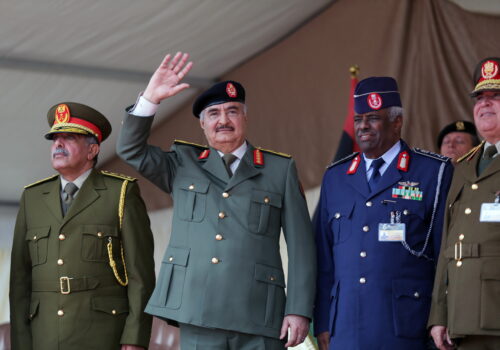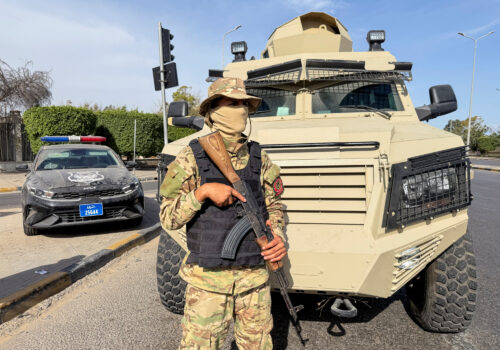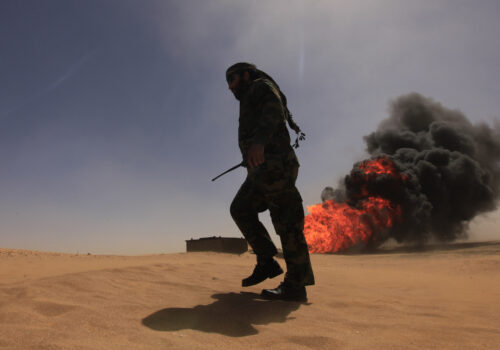Libya’s stalled transition: When domestic spoilers meet foreign interests
On 16 August 2025, Libya held municipal elections in twenty-six municipalities, with turnout reaching 71 per cent—the highest rate since 2014. For a population scarred by war and weary of manipulation, this was an unmistakable demand for governance through the ballot box. Yet the same day, the House of Representatives in the East suspended elections in sixteen municipalities, while armed groups in the West torched electoral offices.
These were not random incidents—but deliberate acts of obstruction by actors who know that real democracy threatens their hold on power.
Libya’s stalled transition has not happened by chance; it has been deliberately engineered into paralysis by both domestic spoilers and foreign powers. The Libyan people, who turned out in large numbers despite threats and violence, have already shown their desire for accountable governance. The challenge now is whether the international community can move beyond token gestures and finally address the forces maintaining Libya’s ongoing limbo. Until that occurs, each new roadmap risks becoming yet another step on the path to nowhere.
Libya’s security stalemate
Libya’s conflict has shifted from open warfare to a frozen stalemate where no side can unify the country, but each has enough coercive strength to hinder progress. In Tripoli, the Government of National Unity (GNU) is at odds with the Deterrence Apparatus (RADA), a militia-turned-security force supported by foreign backers. Their clashes in July 2025 highlighted the fragile security situation in the capital.
In the East, the House of Representatives, backed by Khalifa Haftar’s Libyan Arab Armed Forces (LAAF), has strengthened its control but continues to block national elections. The suspension of municipal contests in August revealed its reliance on coercion rather than legitimacy. Meanwhile, the South remains a governance vacuum. In Kufra, Sudanese refugees now outnumber Libyan residents, escalating tensions that armed groups exploit through smuggling and trafficking.
This is not a lack of war but a controlled fragmentation, where division itself has become the most stable outcome.
SIGN UP FOR THIS WEEK IN THE MIDEAST NEWSLETTER
Domestic spoilers: Entrenched in the status quo
Eleven years without national elections have led to a ruling class that thrives on paralysis. The House of Representatives in Tobruk and the High State Council in Tripoli exemplify this. Aguila Saleh, as Speaker of the House of Representatives, has repeatedly blocked electoral frameworks that could diminish his influence, while figures in the High State Council have exploited their veto power to delay compromise until their interests are secured. Militias further reinforce this deadlock. In Tripoli, armed factions aligned with the GNU control ports, airports, and ministries, using them for rents and intimidation. In the East, Haftar’s LAAF dominates militarily but is tied to the war economy—relying on smuggling, taxation, and foreign aid. In the South, tribal militias benefit from human trafficking and illicit fuel trade. The human toll is severe. Between March 2024 and August 2025, twenty detainees died in custody, including activist Abdel Munim Al-Maremi, whose death following a release order symbolized detention as a tool of repression. These outcomes are not bureaucratic failures but deliberate acts of intimidation.
Yet domestic spoilers persist not only on their own but also with the belief that powerful foreign patrons will shield them from consequences. This is the link between Libya’s internal obstruction and its international entanglement.
Foreign Interference: Managed instability as strategy
Libya today is not abandoned but actively contested. The United Arab Emirates (UAE) and Egypt have long supported Haftar’s LAAF, aiming to block Islamist influence and secure energy access. Turkey has entrenched itself in western Libya with troops, drones, and contractors under a binding security agreement, leveraging its position in Mediterranean maritime disputes. Russia has positioned Wagner fighters in oilfields and bases, using Libya as a logistics hub for African operations and leverage with Europe.
Among allies, competition also persists. Italy prioritizes migration management and ENI—an Italian multinational company—energy concessions, while France often leans toward Haftar for counterterrorism partnerships in the Sahel. The United States officially supports the United Nations’ (UN) track, but has deprioritized Libya, focusing on counterterrorism over political settlement. The European Union (EU) has limited its Libya policy to migration containment, funding detention centers often run by militias—effectively outsourcing abuses in exchange for fewer departures across the Mediterranean.
The outcome is managed instability. Foreign powers ensure that no faction dominates, maintaining Libya as the most convenient equilibrium.
The UN’s roadmap: Process without consequence
The UN continues to develop roadmaps, most recently outlined by SRSG Hanna Tetteh in her August 2025 Security Council briefing. Her twelve-to eighteen-month electoral plan assumes spoilers will eventually cooperate. Yet those who benefit from chaos have no incentive to embrace unity.
The Berlin Process, launched in 2020, exemplifies this contradiction. Designed to enforce the arms embargo and pave the way for elections, it quickly became a façade. The second Berlin Conference in June 2021 reaffirmed commitments, but states doubled down on their proxies: Turkey expanded its military footprint, the UAE and Egypt reinforced Haftar, and Russia deepened Wagner’s role. UN experts documented repeated arms embargo violations, none of which were punished.
Berlin institutionalized interference rather than restraining it, providing a stage for states to claim support for UN mediation while undermining it in practice. By 2025, references to Berlin persist in UN briefings as a ritual rather than a reality.
Policy recommendations: Breaking the cycle of obstruction
Libya’s deadlock needs a shift from symbolic gestures to practical confidence-building. Greater transparency in UN reporting and clearer communication of objectives would reassure Libyans that external actors are dedicated to peace. Financial governance should be improved through joint East–West oversight of oil revenues, with international technical support to ensure fair distribution. On security, the focus should be on capacity-building, not external peacekeeping. Advisory teams, election protection training, and rapid-response support for Libyan institutions would empower local forces while safeguarding electoral processes. International recognition and aid should be used as incentives linked to measurable progress on elections, unification, and rights protection. Civil society, youth, and women must be recognized as genuine stakeholders through mechanisms that ensure their recommendations influence policy, not just reports.
These measures, taken together, would help shift the focus from obstruction to cooperation, making unity more rewarding than division.
Luis Aleman is a global strategist and CEO of LFA Consulting, where he focuses on international economic development, trade policy, and strategic advisory. His work spans Africa, Latin America, the Middle East, South Asia, and Europe, helping governments and institutions navigate complex political and economic landscapes.
Karim Mezran is the director of the North Africa Initiative and a resident senior fellow with the Rafik Hariri Center and Middle East Programs at the Atlantic Council, focusing on the processes of change in North Africa.
Further reading
Mon, Sep 8, 2025
Haftar’s long game: Dynastic power and diplomatic leverage in Libya
MENASource By
Haftar may be shaping not only the current political landscape, but is also positioning himself—and his family—for long-term influence.
Fri, May 16, 2025
The killing of Abdul Ghani al-Kikli may be a turning point for Libya
MENASource By
The killing is considered to be part of a push to eliminate influential militia leaders and consolidate GNU loyalist control over Tripoli.
Wed, Apr 2, 2025
Libya’s political deadlock endures. There is a case for Trump and Meloni to challenge the status quo.
MENASource By
The political crisis in Libya is one that the US and Italy may be uniquely postured, and incentivized, to quell.
Image: August 21, 2025, New York, New York, USA: A back view of the Permanent Representative of Libya to UN, TAHER M. EL-SONNI holding his head on hand, and the sign of Libya in the Security Council. The Security Council reviewed a new UN roadmap for Libya, centred on elections, unity, and dialogue. The UK voiced support, the arms embargo was renewed, and while municipal polls drew strong turnout, insecurity — particularly in Tripoli — remains a concern. (Credit Image: © Bianca Otero/ZUMA Press Wire)



